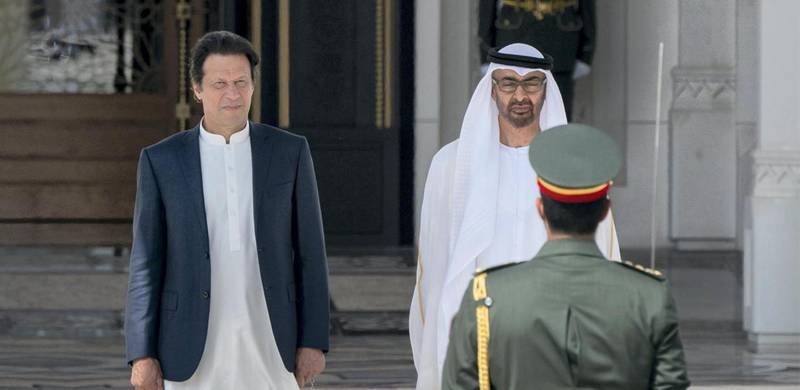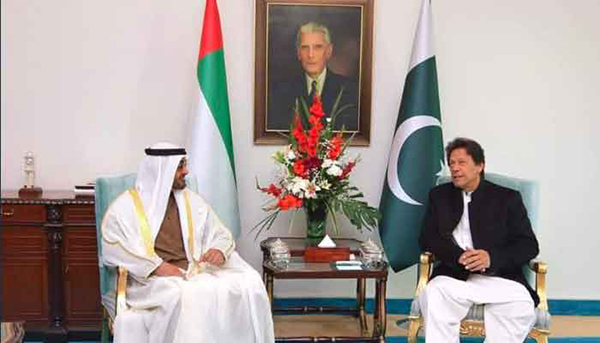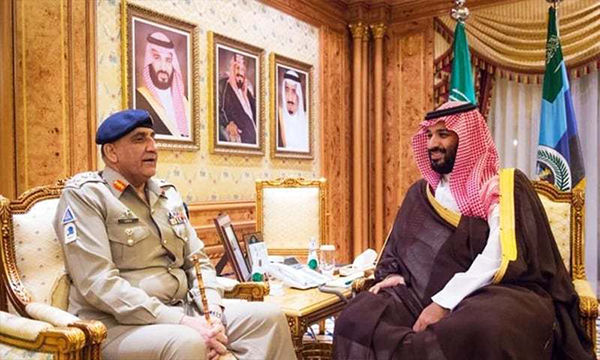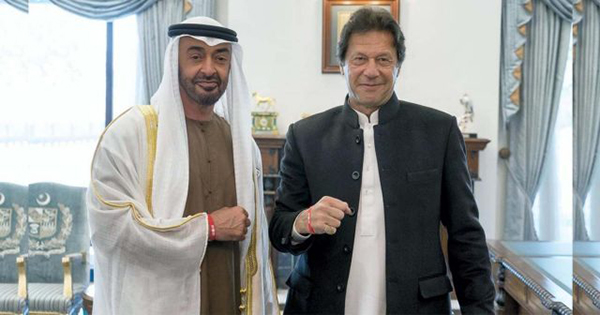
On January 6, 2019 UAE’s Crown Prince Mohammed bin Zayed bin Sultan Al-Nahyan along with the deputy supreme commander of UAE’s armed forces paid a visit to Pakistan – the first by a ruler in almost 12 years – a turn of events considering that Pak-UAE relations had taken a severe dive a few years ago when the government of Pakistan refused to send troops to fight in the Yemen war against the Iran-backed Houthi rebels – in fact it drew unusual criticism from UAE, which had warned that Pakistan might have to pay a ‘heavy price’ for what it called taking an ambiguous stand on the request of Saudi Arabia to commit troops to Yemen. According to various reports, Pakistan and the United Arab Emirates (UAE) have finalised a $6.2 billion support package to help Islamabad address its balance of payments challenge. The package involves $3.2 billion worth of oil supplies on deferred payment, besides a $3 billion cash deposit. Following the announcement, Prime Minister Imran Khan took to Twitter to thank the UAE government for “supporting Pakistan so generously in our testing times.”
https://www.youtube.com/watch?v=b6y0_93nHVQ
Pakistan-UAE relations date back to the UAE’s formation in 1971, and have since evolved into wide-ranging cooperation. In the political arena the UAE has always helped Pakistan during tough times – the 2005 earthquake being a case in point. In 2011, UAE launched a Pakistan Assistance Program focusing on the construction of schools, roads, bridges and for the improvement in the health sector of Pakistan. In the economic realm, UAE hosts nearly 1.5 million Pakistani migrants. According to State Bank of Pakistan figures for July 2018 Pakistan has received remittances amounting to $433.42 million this year.

With regards to the balance of trade figures, they are $6bn in favour of UAE. Pakistan exports to UAE worth USD 869 million and import from UAE worth US$7.5 billion. In Foreign Direct Investment, UAE is one of the largest contributors in Pakistan, the investments being mainly concentrated in banking, telecom and energy sectors. Pakistan-UAE defence partnership is also immensely important. In June 1994, Pakistan and UAE institutionalized their defence relations by establishing ‘Defence Consultative Group’ aiming to enhance defence cooperation by increasing intelligence sharing, joint military exercises, training and production. High level military meetings also take place from time to time. Pakistan has the singular distinction of establishing the UAE Air Force after its independence in 1971.

The foreign policy overtures of the present government seem to be the same as they were with the previous governments – the only thing different is that Mr Khan is reaching out to the Middle Eastern countries with a business/investment framework in mind, unlike his predecessors. Moreover, the UAE package is very similar to the one proposed by the Saudis. Pakistan has already received $2bn in cash deposit from Saudi Arabia at an interest rate of 3.18pc while the third portion of $1bn is due in the first week of February. In addition to this, Saudi Arabia will establish an oil refinery in Pakistan's strategic port city of Gwadar at a cost of $10 billion. The agreement will likely be finalised when Crown Prince Mohammad Bin Salman visits Pakistan in February.
https://www.youtube.com/watch?v=GPw4Lzx637o
It should not be forgotten that investment aside, there are certain problematic areas that need to be addressed as well. First and foremost is the migrant issue and the inadequacy to protect worker rights in the UAE. The background channels of issuing migrant work permits must be stopped and it should be ensured that the kafala system does not become a means of bonded labour in the GCC. Adequate training should also be provided to workers and awareness needs to be raised. Trade between the two countries is dwindling and should be also be addressed. To cover the huge trade deficit between the two countries, maybe the import of rice and sugar from Pakistan can be allowed for cooperative stores in UAE. UAE was also very vocal in admonishing Pakistan when it refused to send troops for the Yemen war in 2015. The UAE needs to respect Pakistan’s neutrality and stop pressuring Pakistan in this regard.
The real question is that since there is no such thing as a free lunch, what will the Arabs get in return? Or rather what do they expect in return?

The exchange of expensive gifts – the Saudis recently gifted PM Khan a ‘gold Kalashnikov’ and bullets – shows that the Arabs are serious about getting some sort of leverage with the new government. The establishment of the oil refinery would mean that the Arabs will become an important part of the China-Pakistan Economic Corridor (CPEC). Though at this point details are scanty, it is an open secret that the mere presence of the Saudis and Emiratis in Gawadar won’t bode well with the Iranians. Having some sort of presence in the region will be one way of the Arabs keeping an eye on their long- time arch rivals.
Saudi and Emirati investment will no doubt help Pakistan, especially considering the picture of the economy. But it would be wise of Mr Khan to exhibit prudence and spell out all terms and conditions beforehand. Though Pakistan has always been vocal about maintaining a neutral stance come third party wars, investment strings could turn into a death knell if hypothetically another ‘request for troops’ (circa 2015) comes calling.
https://www.youtube.com/watch?v=b6y0_93nHVQ
Pakistan-UAE relations date back to the UAE’s formation in 1971, and have since evolved into wide-ranging cooperation. In the political arena the UAE has always helped Pakistan during tough times – the 2005 earthquake being a case in point. In 2011, UAE launched a Pakistan Assistance Program focusing on the construction of schools, roads, bridges and for the improvement in the health sector of Pakistan. In the economic realm, UAE hosts nearly 1.5 million Pakistani migrants. According to State Bank of Pakistan figures for July 2018 Pakistan has received remittances amounting to $433.42 million this year.

With regards to the balance of trade figures, they are $6bn in favour of UAE. Pakistan exports to UAE worth USD 869 million and import from UAE worth US$7.5 billion. In Foreign Direct Investment, UAE is one of the largest contributors in Pakistan, the investments being mainly concentrated in banking, telecom and energy sectors. Pakistan-UAE defence partnership is also immensely important. In June 1994, Pakistan and UAE institutionalized their defence relations by establishing ‘Defence Consultative Group’ aiming to enhance defence cooperation by increasing intelligence sharing, joint military exercises, training and production. High level military meetings also take place from time to time. Pakistan has the singular distinction of establishing the UAE Air Force after its independence in 1971.

The foreign policy overtures of the present government seem to be the same as they were with the previous governments – the only thing different is that Mr Khan is reaching out to the Middle Eastern countries with a business/investment framework in mind, unlike his predecessors. Moreover, the UAE package is very similar to the one proposed by the Saudis. Pakistan has already received $2bn in cash deposit from Saudi Arabia at an interest rate of 3.18pc while the third portion of $1bn is due in the first week of February. In addition to this, Saudi Arabia will establish an oil refinery in Pakistan's strategic port city of Gwadar at a cost of $10 billion. The agreement will likely be finalised when Crown Prince Mohammad Bin Salman visits Pakistan in February.
https://www.youtube.com/watch?v=GPw4Lzx637o
It should not be forgotten that investment aside, there are certain problematic areas that need to be addressed as well. First and foremost is the migrant issue and the inadequacy to protect worker rights in the UAE. The background channels of issuing migrant work permits must be stopped and it should be ensured that the kafala system does not become a means of bonded labour in the GCC. Adequate training should also be provided to workers and awareness needs to be raised. Trade between the two countries is dwindling and should be also be addressed. To cover the huge trade deficit between the two countries, maybe the import of rice and sugar from Pakistan can be allowed for cooperative stores in UAE. UAE was also very vocal in admonishing Pakistan when it refused to send troops for the Yemen war in 2015. The UAE needs to respect Pakistan’s neutrality and stop pressuring Pakistan in this regard.
The real question is that since there is no such thing as a free lunch, what will the Arabs get in return? Or rather what do they expect in return?

The exchange of expensive gifts – the Saudis recently gifted PM Khan a ‘gold Kalashnikov’ and bullets – shows that the Arabs are serious about getting some sort of leverage with the new government. The establishment of the oil refinery would mean that the Arabs will become an important part of the China-Pakistan Economic Corridor (CPEC). Though at this point details are scanty, it is an open secret that the mere presence of the Saudis and Emiratis in Gawadar won’t bode well with the Iranians. Having some sort of presence in the region will be one way of the Arabs keeping an eye on their long- time arch rivals.
Saudi and Emirati investment will no doubt help Pakistan, especially considering the picture of the economy. But it would be wise of Mr Khan to exhibit prudence and spell out all terms and conditions beforehand. Though Pakistan has always been vocal about maintaining a neutral stance come third party wars, investment strings could turn into a death knell if hypothetically another ‘request for troops’ (circa 2015) comes calling.
